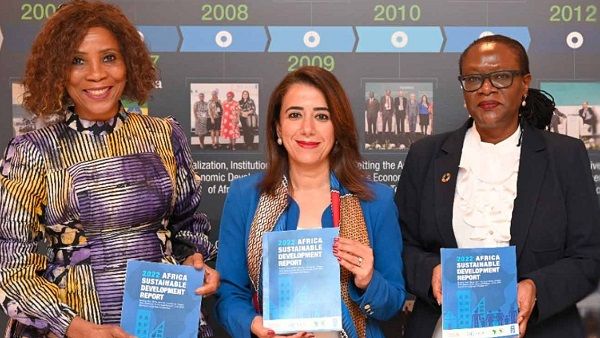
Greater action required if Africa is to meet SDG and Agenda 2063 targets says new report

By Freeman ya Ngulu.
According to the status report on the SDGs released during the African Economic Conference 2022 in Mauritius, most African countries are struggling to meet the SDG targets with 2030 less than eight years away.
The African Union Commission (AUC), the United Nations Economic Commission for Africa (ECA), the African Development Bank (AfDB) and the United Nations Development Programme (UNDP) jointly released the status report.
Without renewed efforts, nearly 492 million Africans will remain in extreme poverty by 2050, with at least 350 million still in that situation.
Namibia is ranked 114 out 163 countries with a country score of 62.7 and a regional average of 53.6.
The major challenges cited by the report are the No Poverty SDG with a downward decreasing trend, Zero Hunger which is stagnating and is listed as a significant challenge while there was no information available for the Reduced Inequalities SDG metric. Another decreasing SDG was for Sustainable Cities and Communities while The Good Health and Well-being , Decent Work and Economic Growth and Industry Innovation and Infrastructure , Life Below Water and Life on Land show moderate improvement.
Those on track or maintaining SDG achievements include Climate Action, Quality Education and Gender Equality.
While Advancing the Full Implementation of the 2030 Agenda for Sustainable Development assesses Africa’s progress to the SDGs and the African Union’s Agenda 2063, progress was hampered by Covid-19, escalating food prices and the impact of climate change on local communities.
“Africa can no longer wait on the margins; the time has come for the continent to retrace its steps and take ownership of its development agenda,” said Ms Ahunna Eziakonwa, UNDP Assistant Administrator and Regional Director for Africa.
The 2022 Africa SDGs report examines five SDGs in depth: Goals 4 (Quality Education), 5 (Gender Equality), 14 (Life Below Water), and 15 (Life on Land) and Goal 17 (Partnerships for the Goals).
SDG 4: Quality Education is one of the report’s highlights
Africa has made slow progress in providing universal access to high-quality education. Despite significant improvements in school enrollment, 288 million school-age children are not enrolled, particularly in conflicted countries. Increased funding for education infrastructure, particularly at the pre-primary and primary levels, is required, according to the report. Other areas that require investment include teacher training and digital connectivity.
Gender Equality (SDG 5):
The report indicates slow progress on gender inclusivity across Africa and recommends the implementation of legal frameworks to protect women and girls from discrimination, domestic violence, child marriage, and female genital mutilation. For example, despite the fact that women make up a sizable proportion of Africa’s labour force, only 29.8% of managerial positions across the continent, excluding North Africa , were held by women in 2022, up modestly from 29.3% in 2015.
Life Below Water (SDG 14):
Human-caused organic and chemical pollutants continue to endanger Africa’s marine ecosystem. The report advocates for increased institutional capacity to enforce laws and regulations governing the responsible use of marine resources. Many African countries, particularly its small island developing states, rely heavily on marine life for a living (SIDS).
SDG 15: Life on Land:
According to the report, deforestation for farming and grazing, as well as climate change, continue to cause high and widespread loss of forest cover, biodiversity, and land degradation in Africa. Land degradation affects 46% of Africa’s land and 65% of its population, costing the continent US$9.3 billion per year. More public-private collaboration is required to mobilize and channel funding to scale up sustainable management of land, forests and biodiversity towards a green and resilient recovery.
Partnerships (SDG 17):
According to the report, the continent has made only slow progress with this goal. Domestic revenue generation and foreign direct investment in Africa continue to lag behind those of other regions. Debt management continues to be a challenge for African governments, and debt servicing depletes already limited capital resources. In 2020, Africa will have lost approximately US$89 billion due to illicit financial flows (IFFs).
Several recommendations are made in the report. These include increased domestic resource mobilization and a reduction in illicit financial flows. It also proposes soliciting international support for the implementation of innovative financial instruments such as green and blue bonds and debt-for-climate swaps.
“We must do more as a continent to achieve better results. Knowing the difficulties we face, it is critical that we look inward and find a solution. The partnership between AfDB, ECA, AUC and UNDP is a good platform that presents the challenges for our countries to tackle”, said Vincent Nmehielle, Secretary General of the African Development Bank Group.
To get back on track, Africa needs to foster its domestic resource mobilisation and savings, as well as boost its Information and Communication Technology infrastructure to drive achievement of the SDGs and the Agenda 2063.
“I am hopeful that the findings and recommendations of the 2022 Africa SDGs Report will help member states to take urgent action to accelerate attainment of the SDGs and Agenda 2063,” said Dr Hanan Morsy, Deputy Executive Secretary and Chief Economist of ECA.
Partners launching the report. From the left are Ms Ahunna Eziakonwa, the UNDP Assistant Administrator and Director of Regional Bureau for Africa, Dr Hanan Morsy, Deputy Executive Secretary of ECA, and Ms Amanda Serumaga, UNDP Resident Representative for Mauritius and Seychelles.











































